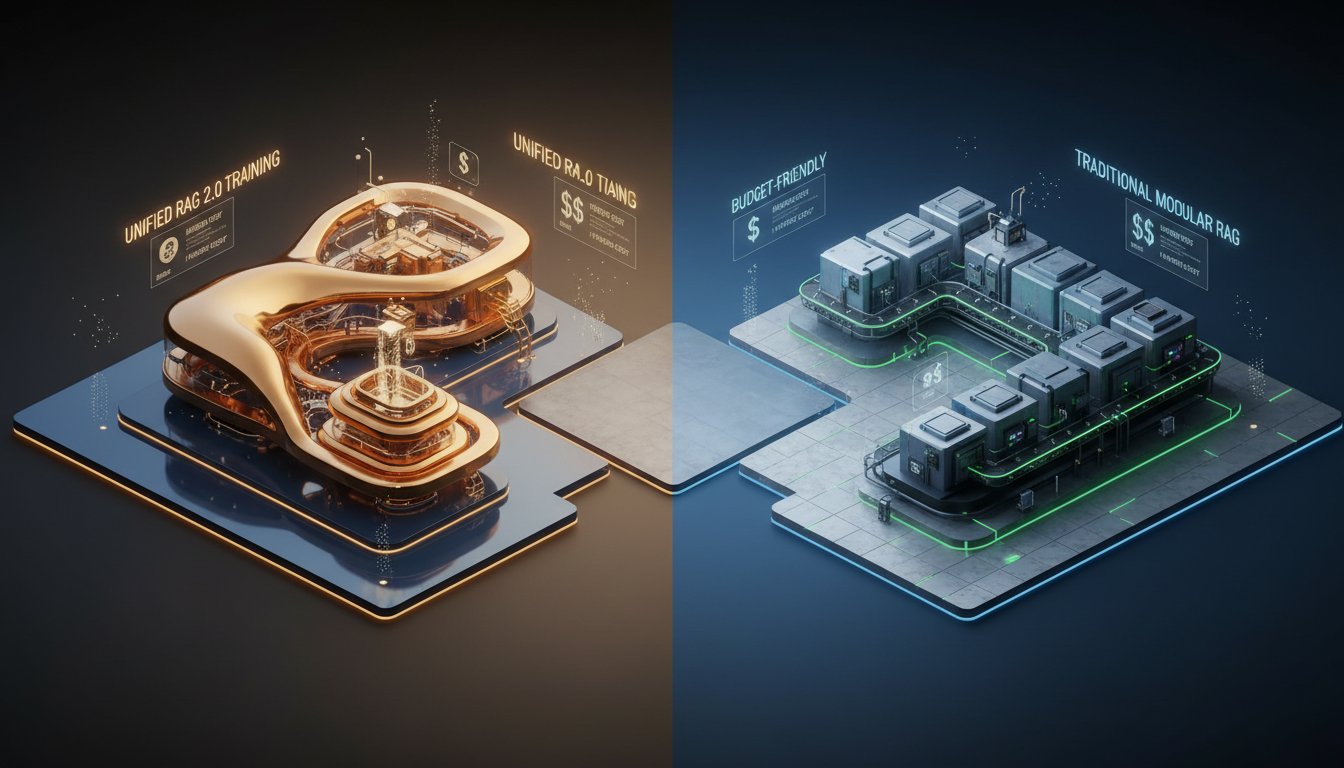Enterprise AI teams face a harsh reality: 89% of AI projects fail to reach production, and security concerns are the primary culprit. While organizations rush to implement Retrieval Augmented Generation (RAG) systems, they quickly discover that connecting large language models to enterprise data isn’t just a technical challenge—it’s a security nightmare that can paralyze entire initiatives.
But AllCloud’s newly launched AI Fusion framework is changing this narrative. Built on their TrustStack foundation and engineered specifically for AWS environments, this multi-layer architecture promises to accelerate enterprise RAG deployments by up to 70% while maintaining the security standards that regulated industries demand.
The framework addresses the fundamental tension between AI innovation speed and enterprise security requirements—a balance that has proven elusive for most organizations attempting large-scale RAG implementations.
The Enterprise RAG Security Dilemma That’s Blocking AI Adoption
Enterprise RAG systems face unique challenges that don’t exist in consumer AI applications. Unlike simple chatbots that work with public data, enterprise RAG must connect LLMs to sensitive corporate information while maintaining strict access controls, audit trails, and regulatory compliance.
The core security challenges include:
Data Boundary Control: Traditional vector databases sync periodically, creating windows where sensitive data might be accessible without proper authorization. This lag between data updates and access control enforcement creates compliance risks that many enterprises simply cannot accept.
Multi-Tenant Isolation: Enterprise RAG systems must serve multiple departments or business units while ensuring complete data isolation. A single misconfiguration could expose confidential information across organizational boundaries.
Audit Trail Complexity: Regulatory frameworks like HIPAA, PCI-DSS, and GDPR require detailed logging of data access patterns. Traditional RAG implementations struggle to provide the granular audit trails that compliance teams demand.
Vector Database Vulnerabilities: Most vector databases weren’t designed with enterprise security as a primary concern. They lack the sophisticated access controls and encryption standards that enterprise data requires.
These challenges have created a bottleneck where organizations spend months building custom security layers before they can begin actual RAG development—if they proceed at all.
How AI Fusion’s Multi-Layer Architecture Transforms Enterprise RAG
AllCloud’s AI Fusion framework approaches enterprise RAG through a fundamentally different lens. Instead of treating security as an afterthought, the framework embeds defense-grade controls directly into the deployment architecture from day one.
Foundation Layer: TrustStack Security Integration
The framework’s foundation rests on AllCloud’s TrustStack solution, a prevention-first cybersecurity platform designed specifically for highly regulated industries. This isn’t just another security add-on—it’s a comprehensive AWS-native environment that embeds prescriptive controls directly into the cloud infrastructure.
TrustStack provides:
– Multi-account AWS environments with built-in security guardrails
– Automated compliance enforcement for standards like HIPAA and PCI-DSS
– Infrastructure-as-Code (IaC) tools with embedded policy enforcement
– Pre-configured incident response frameworks
This foundation eliminates the months of security architecture work that typically precedes enterprise RAG deployments.
Knowledge Intelligence Platform: Enterprise-Grade RAG Implementation
At the core of AI Fusion lies the Knowledge Intelligence Platform, which transforms enterprise information into AI-ready knowledge through sophisticated RAG patterns. This platform addresses the specific challenges of enterprise data integration:
Secure Data Transformation: The platform connects LLMs to enterprise knowledge bases while maintaining strict data lineage and access controls. Every piece of information retains its original security context as it moves through the RAG pipeline.
Real-Time Access Control: Unlike traditional vector databases that rely on periodic synchronization, the Knowledge Intelligence Platform implements real-time authorization checks. This ensures that users only access data they’re entitled to see, even as permissions change dynamically.
Context-Aware Responses: The platform doesn’t just retrieve relevant documents—it understands the security context of both the user and the data, providing responses that respect organizational boundaries and compliance requirements.
MCP Enterprise Integration Hub: Universal Connectivity
The framework includes a standardized Model Context Protocol (MCP) implementation that enables secure connectivity across enterprise systems. This hub provides:
- Universal connectors for major enterprise platforms
- Protocol adapters that maintain security context across system boundaries
- Secure API management with built-in monitoring and rate limiting
- Automated data governance enforcement
This integration layer solves the “data silo” problem that plagues many enterprise RAG implementations, allowing organizations to create unified knowledge bases without compromising security.
Intelligent Document Orchestration: AI Agent Coordination
The framework’s orchestration platform coordinates multiple AI agents to extract, analyze, and route information across enterprise systems. This approach provides several advantages:
Distributed Processing: Instead of creating a single point of failure, the orchestration platform distributes RAG workloads across multiple specialized agents, each with specific security permissions.
Workflow Automation: The platform automates complex document processing workflows while maintaining audit trails for every action and decision.
Bottleneck Elimination: By coordinating multiple agents, the platform eliminates the processing bottlenecks that often limit RAG system performance in enterprise environments.
Real-World Implementation: The 70% Acceleration Promise
The “70% faster deployment” claim isn’t marketing hyperbole—it’s based on eliminating the security architecture phase that typically consumes 60-80% of enterprise RAG project timelines.
Traditional enterprise RAG projects follow this pattern:
– Months 1-3: Security architecture and compliance framework development
– Months 4-6: Custom integration development for enterprise systems
– Months 7-9: Security testing and compliance validation
– Months 10-12: Production deployment and monitoring setup
AI Fusion collapses this timeline by providing pre-built, validated components:
– Week 1-2: Requirements gathering and environment configuration
– Week 3-6: Data integration and model customization
– Week 7-10: Testing and performance optimization
– Week 11-12: Production deployment and user training
This acceleration comes from three key factors:
Pre-Validated Security: TrustStack’s defense-grade controls are already validated for major compliance frameworks, eliminating the need for custom security architecture.
Standardized Integrations: The MCP Enterprise Integration Hub provides pre-built connectors for major enterprise platforms, reducing integration development time from months to days.
Operational Readiness: The framework includes built-in monitoring, alerting, and governance tools, eliminating the need to build custom operational infrastructure.
Enterprise RAG Best Practices Embedded in the Framework
AI Fusion incorporates several enterprise RAG best practices that organizations typically learn through expensive trial and error:
Data Perimeter Security
The framework implements sophisticated data boundary controls that go beyond simple role-based access. Instead of treating all enterprise data as equally sensitive, the platform understands data classification levels and applies appropriate security measures.
Contextual Embedding Security
Traditional RAG systems embed documents without preserving security context. AI Fusion maintains security metadata throughout the embedding process, ensuring that vector similarity searches respect access controls.
Multi-Model Orchestration
The platform supports multiple LLM deployments with different security clearances. Highly sensitive queries can be routed to models running in isolated environments, while general queries use more efficient shared resources.
Compliance-Aware Logging
Every interaction with the RAG system generates detailed audit logs that map to specific compliance requirements. This isn’t just technical logging—it’s compliance-ready documentation that auditors can easily review.
Addressing Common Enterprise RAG Implementation Challenges
Based on analysis of Stack Overflow questions and enterprise implementation challenges, AI Fusion specifically addresses several pain points:
Vector Database Scaling Issues
Many organizations hit scaling walls around 50 million vectors when using traditional vector databases. AI Fusion’s architecture supports automatic sharding with rebalancing, enabling deployments that scale to billions of vectors without service interruption.
Empty Search Results
A common problem in enterprise RAG is empty search results despite populated databases. This often occurs due to security filtering that removes all relevant results. AI Fusion’s contextual search understands user permissions and provides meaningful “no results” explanations that help users understand access limitations.
Cross-Platform Integration Complexity
Enterprises typically run multiple AI frameworks (LangChain, LlamaIndex, CrewAI) alongside various vector stores. AI Fusion’s standardized interfaces reduce this complexity, providing consistent APIs regardless of the underlying implementation.
Security Features That Set AI Fusion Apart
The framework’s security capabilities go beyond what most enterprise RAG implementations achieve:
Zero-Trust Architecture: Every component assumes breach and validates every request, providing defense in depth that protects against both external threats and insider risks.
Encryption at Rest and in Transit: All data, including vector embeddings, remains encrypted with enterprise-grade keys. This ensures that even database administrators cannot access sensitive information.
Dynamic Access Control: Permissions can change in real-time without requiring system restarts or cache clearing. This enables organizations to respond quickly to security incidents or organizational changes.
Bias Monitoring: The framework includes built-in bias detection and monitoring, helping organizations identify when AI responses might be influenced by skewed training data or unfair access patterns.
The Future of Secure Enterprise RAG
AI Fusion represents a significant evolution in enterprise RAG thinking. Instead of treating security as a constraint that slows AI adoption, the framework demonstrates that proper security architecture can actually accelerate deployment by eliminating the trial-and-error phase that plagues most enterprise AI projects.
This approach aligns with broader industry trends toward “security by design” in AI systems. As regulatory frameworks like the EU AI Act become more stringent, organizations that embed security from the beginning will have significant advantages over those trying to retrofit compliance into existing systems.
The framework’s modular architecture also provides a foundation for future AI capabilities. As new models and techniques emerge, organizations can integrate them into their existing AI Fusion deployment without rebuilding their security infrastructure.
Implementation Recommendations for Enterprise Teams
For organizations considering enterprise RAG deployments, AI Fusion offers several strategic advantages:
Start with Security: Rather than building RAG capabilities and adding security later, begin with a secure foundation that can support various AI use cases as they emerge.
Leverage AWS Native Services: The framework’s deep AWS integration provides access to cutting-edge AI services while maintaining enterprise security standards.
Plan for Scale: The framework’s architecture supports growth from proof-of-concept to enterprise-wide deployment without architectural changes.
Focus on Governance: Built-in audit trails and compliance features provide the governance foundation that enterprise AI initiatives require.
AllCloud’s AI Fusion framework demonstrates that enterprise RAG doesn’t have to choose between security and speed. By embedding defense-grade controls into a scalable, AWS-native architecture, the framework enables organizations to deploy production-ready RAG systems in weeks rather than months. For enterprises that have been hesitant to pursue AI initiatives due to security concerns, AI Fusion provides a proven path forward that maintains the rigorous standards that regulated industries demand while delivering the innovation speed that modern business requires.




